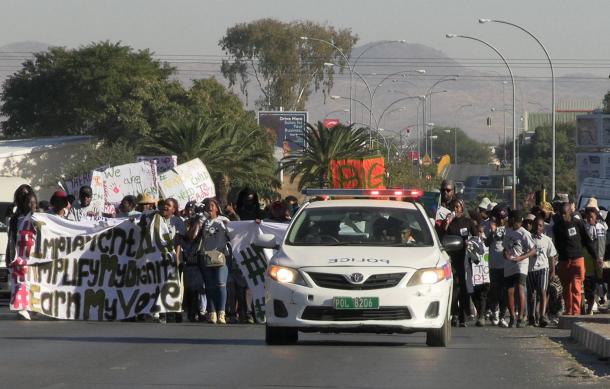
A petition demanding the immediate implementation of a Universal Basic Income Grant in Namibia was officially received by Minister of Gender Equality, Poverty Eradication, and Social Welfare, Doreen Sioka, on behalf of President Nangolo Mbumba.
This event followed a demonstration by petitioners who took to the streets of Windhoek to voice their demands.
The petition, initiated by the Basic Income Grant Coalition of Namibia, has garnered 3,589 signatures and calls for a monthly payment of N$500 to all Namibians aged between 0 to 59 to alleviate poverty and improve living standards.
Nafimane Hamukoshi who read the petition said "for the past 34 years, too many Namibians have been living under inhumane and degrading conditions. We have been struggling to meet our basic human needs but we are confronted without a basic income, decent roof over our heads, clean water and sanitation. Our human rights are violated by our leaders who have failed to improve our lives after independence".
Receiving the petition, Minister Doreen Sioka assured the coalition and the public that she would deliver the petition to the President for further consideration.
"I will take your petition to the President and because your demands belong to my ministry, we will sit and brief you how far we have gone. You are the people that put us on government, and there is no way you can go and cry except on the shoulders of this government".
The demonstrators, mostly the youth, emphasised their ongoing struggles, living under inhumane and degrading conditions, lacking decent income, housing, clean water, and sanitation.
The petition highlights that despite promises of prosperity made at independence, the government has failed to provide long-term relief from poverty.
Namibia's alarming unemployment rate, which stands at 33 percent and the widening gap between the rich and poor, are central issues the petition seeks to address.
The proponents are of the view that, the Universal Basic Income Grant has the potential to break the shackles of poverty and end hunger, while offering economic freedom and an opportunity for people to pursue their life choices and fulfill their potential.
It also references the success of a BIG pilot study conducted in Otjivero-Omitara, where recipients used the grant to improve their livelihoods.
The coalition calls for the government's commitment and stresses the need for the mining and fishing industries to contribute their fair share of taxes to fund the BIG scheme.
They argue that reducing poverty through BIG will enhance national peace, security, and stability.





